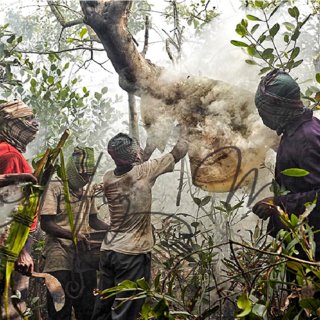Kendrapara: Illegal honey harvesting is the major reason behind recurring forest fires in Bhitarkanika National Park situated under Rajnagar forest division in Kendrapara district. Notably, there have been as many as 11 cases of forest blazes in Bhitarkanika National Park during the last four years. This has destroyed hundreds of acres of forest land. The fire has destroyed acres of casuarina and mangrove forest cover. With the fear over forest fires intensifying as summer season draws near, a probe was conducted to ascertain the factors causing wildfires. The probe indicated the involvement of outside honey traders responsible for the infernos. The recovery of gunny bags and matchboxes in the jungle holds proof of their involvement. The probe suggested that the traders engage locals to collect honey from the beehives. The honey collectors use firebrands to drive away bees from the hives before collecting honey. The smoke and the razing fire frighten the bees forcing them to fly away.
Later, the traders pull down the hives and collect the honey. Later, they dump the firebrands in the jungle causing forest fires. The probe also brought to the fore that four acre forest land in Barunei jungle was destroyed in forest fires in April, 2018.
The collection of honey is done usually during summer – mostly in April and May. Honey traders regularly visit jungles in Bhitarkanika and harvest the major forest produce using firebrands. Moreover, the unabated use of firebrands for honey harvesting has led to a decline in the honeybee population which, if not checked, could spell disaster for the ecosystem. The traders do not abide by the norms and also engage locals, lured with some money, in the harvesting work. This has been going on for several years, thereby posing a serious threat to the national park including its flora and the endangered species residing in it. Bhitarkanika National Park is spread over 672 sq km and is known worldwide for its rich biodiversity. Out of the total area, 145 sq km is covered by dense forest which is a prohibited zone for common people. “This dense forest is filled with natural bounties. The area is famous for wild honey and it boasts of a record collection of 480 quintals of honey in a single year. The craze for honey harvesting among traders is the reason behind the destruction of large tracts of forests in Bhitarkanika,” said environmentalists Hemant Kumar Rout, Ashok Kumar Swain, Prabhu Prasad Mohapatra, and SK Chand.
Locals demanded that the Forest department should take an initiative to train the local residents in proper and sustainable honey collection methods and protection of bees. This will also help in availability of pure wild honey of Bhitarkanika in the market. This will also aid the Forest department in collecting more revenue and help over 5,000 locals earn their livelihood.







































